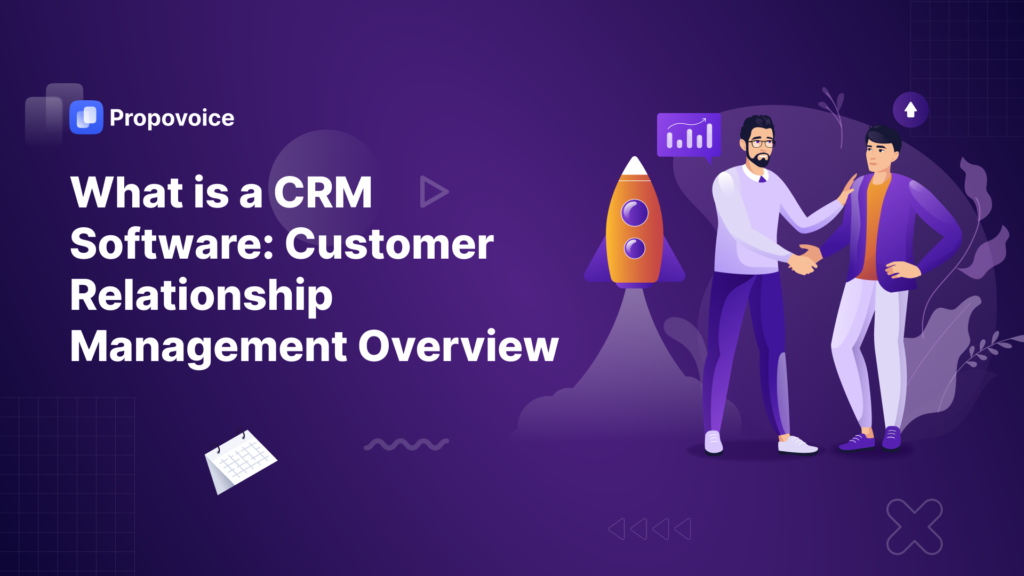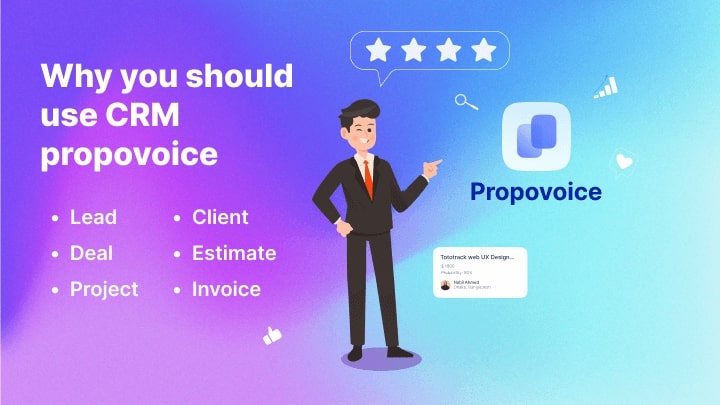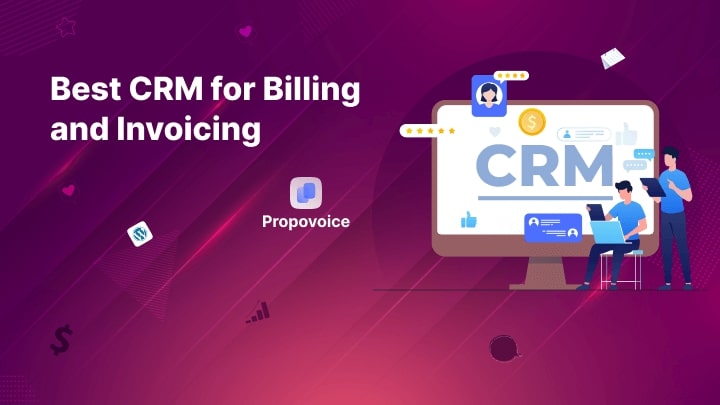From sales and marketing to customer service and even operations, CRM software is transforming the way businesses operate. From its humble beginnings in the 1960s, CRM has developed into a powerful tool that can help companies maximize their potential and increase customer satisfaction. But what is CRM software, and how does it work?
In this blog post, we’ll take an in-depth look at CRM software. We’ll explain what it is, cover common types of CRM software, and examine the benefits and costs of using CRM software. We’ll also delve into topics such as how CRM helps with sales and how Propovoice CRM, used in WordPress, helps manage customers.
So, whether you’re just starting to learn about CRM, or you’re looking for a refresher, this blog post has you covered. Let’s dive in!
Table of Contents
What is CRM Software?
Customer Relationship Management (CRM) software is a system used to help businesses better manage customer relationships and data. It is a web-based solution, designed to streamline and optimize business processes, from customer lead management to sales and service. The software provides a comprehensive view of customer data, enabling businesses to analyze customer behavior and improve customer satisfaction.
The primary purpose of CRM software is to assist businesses in identifying sales opportunities, improving customer relationships, and delivering exceptional customer experiences. It allows businesses to track vital customer data, including contact information, activity history, product purchases, and more. By leveraging this data, businesses gain valuable insights into customer behavior, enabling them to tailor their products and services to meet specific customer needs.
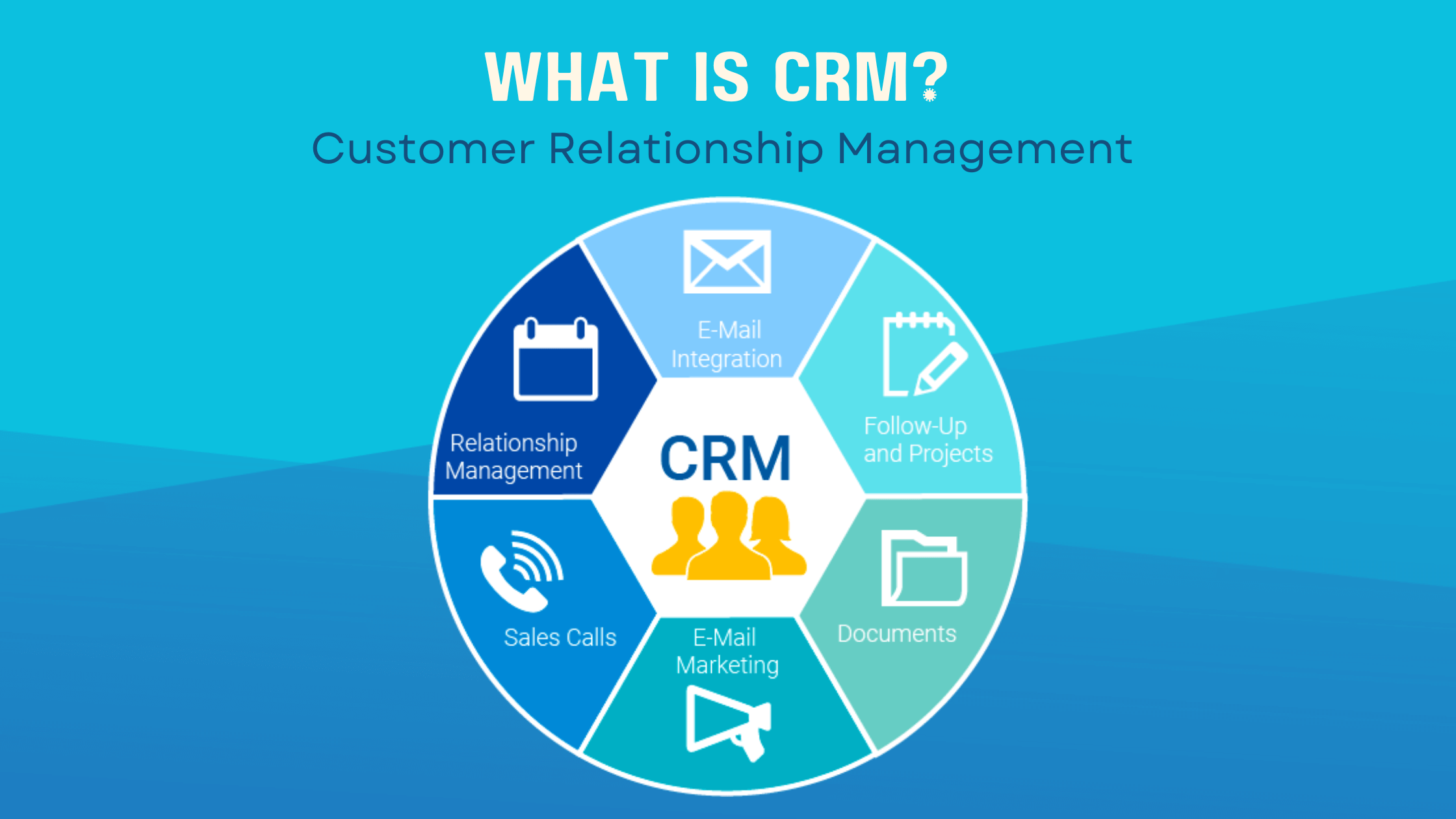
CRM software also facilitates effective customer relationship management by offering tools for customer segmentation, lead management, and sales tracking. With an up-to-date and comprehensive view of customer data, businesses can easily manage customer relationships and identify potential opportunities. Additionally, CRM software provides features for customer segmentation, empowering businesses to target customers based on their unique preferences and requirements.
Moreover, CRM software enables businesses to track customer activities and purchases. This data plays a crucial role in identifying sales opportunities, developing targeted marketing campaigns, and optimizing customer service. Furthermore, it helps businesses understand customer behavior and enhance overall customer satisfaction.
Overall, CRM software serves as a valuable tool for businesses, enabling them to improve customer relationships, enhance customer service, and identify sales opportunities. By providing real-time customer data, the software allows businesses to personalize their products and services to meet customer needs and gain a comprehensive understanding of customer behavior. Consequently, businesses can increase customer satisfaction levels and identify new avenues for sales growth.
Benefits of Using CRM Software
CRM software offers numerous benefits to businesses of all sizes. It facilitates efficient customer data management, automates marketing processes, tracks sales performance, and provides deep insights into customer behavior. The ultimate objective of any CRM system is to equip companies with the tools and capabilities to interact with customers effectively and build long-term relationships.
CRM software enables businesses to collect and store customer data in a central repository. This comprehensive view of customer information helps companies gain a better understanding of customer preferences, needs, and interests. Additionally, it enables businesses to track customer interactions across multiple channels, such as email, social media, telephone, and in-person meetings.
By leveraging CRM software, businesses can automate marketing and sales processes. For instance, they can utilize the system to send automated emails to customers, track responses, and follow up accordingly. Furthermore, CRM software allows businesses to analyze customer data and develop personalized marketing campaigns tailored to individual customer needs and interests.
The software also serves as a valuable tool for tracking sales performance. Businesses can monitor metrics such as sales volume, customer retention rates, and customer satisfaction levels. This data aids in identifying areas for improvement and enables businesses to refine their sales strategies for optimal effectiveness.
Lastly, CRM software empowers businesses to gain deep insights into customer behavior. This information can be utilized to create highly targeted marketing campaigns and improve customer service. By gaining a thorough understanding of their customers, companies can anticipate their needs and deliver exceptional experiences.
In summary, CRM software is an essential tool for businesses of all sizes. It aids in managing customer data and interactions, automating marketing processes, tracking sales performance, and providing deep insights into customer behavior. With the right CRM system, businesses are well-equipped to interact with customers effectively and build long-lasting relationships.
Read more: Why you should use CRM for your Service and Business
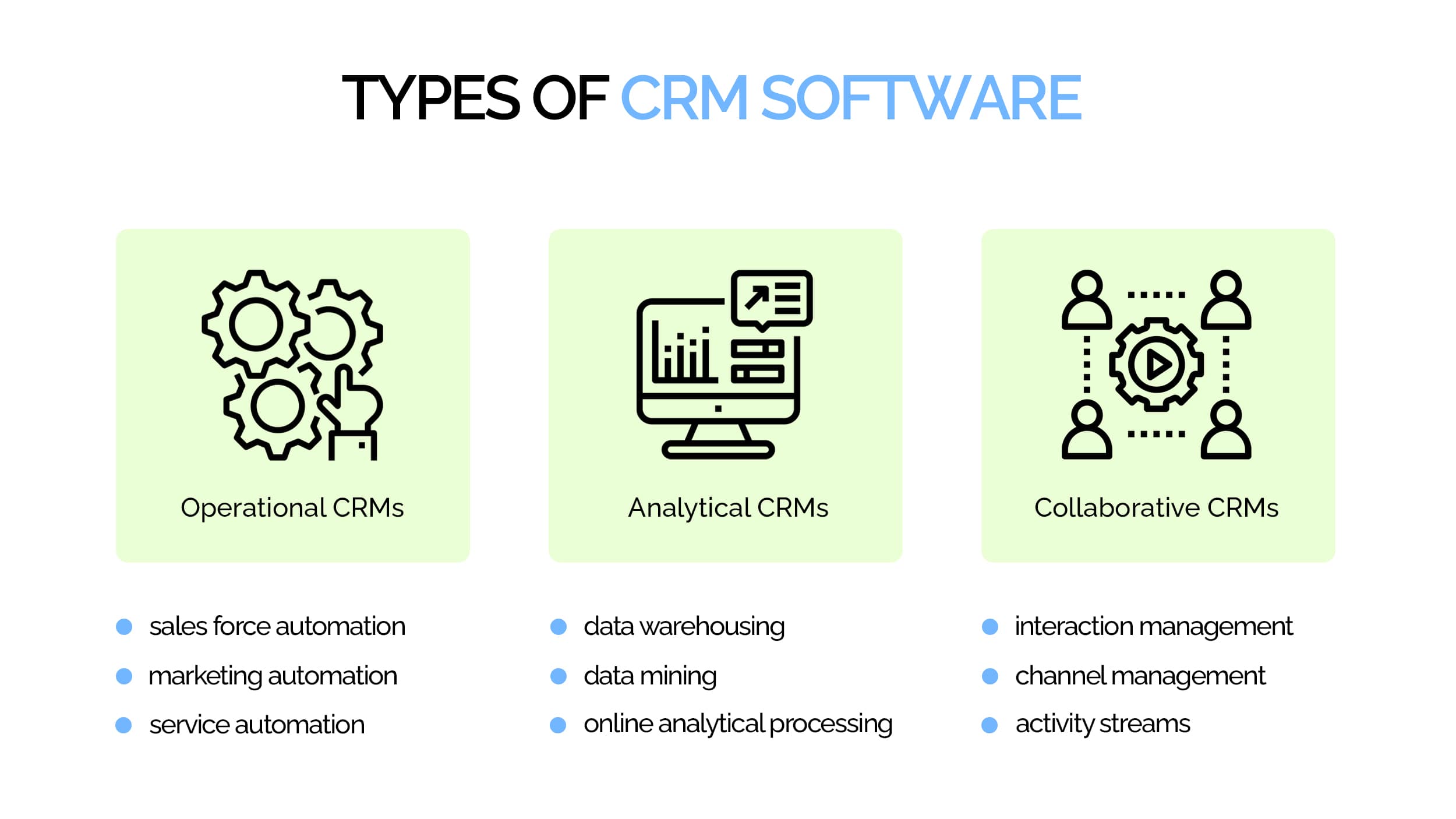
Different Types of CRM Software
When it comes to CRM software, there are several different types to choose from, each with its own set of features and capabilities. The most basic types are Operational, Analytical, and Collaborative CRMs. However, all these types also can be broken down based on their technology. Here is a look at some of the different types of CRM software available:
1. On-Premise CRM:
On-premise CRM systems are installed directly on the business’s own servers and are managed and maintained by the business. These systems are typically more expensive than cloud-based CRMs but provide the business with more control and customization options.
2. Cloud-Based CRM:
Cloud-based CRM systems are hosted and managed by a third-party provider and accessed via the Internet. This type of CRM is often more cost-effective since the business does not need to purchase and maintain its own hardware and software.
3. Mobile CRM:
Mobile CRM systems are designed to be used on mobile devices such as smartphones and tablets. This type of CRM allows businesses to access customer data and take action while on the go.
4. Social CRM:
Social CRM systems are designed to integrate with social media platforms such as Facebook, Twitter, and LinkedIn. This type of CRM allows businesses to track customer conversations and interactions across social media platforms and use the data to improve customer experience.
5. Open Source CRM:
Open-source CRM systems are based on open-source code and can be modified to fit the needs of the business. This type of CRM is typically more cost-effective since the business can customize the code to create the exact features it needs. For example, Propovoice is an open-source CRM that is free to start with and helps small businesses to manage their clients, invoices, estimates and projects.
When it comes to choosing the right type of CRM software, it’s important to consider the specific needs of the business. Different types of CRM software offer different features and capabilities, so it’s important to take the time to evaluate each type to determine which one is best suited for the business’s needs.
How to Choose the Right CRM Software
When selecting the right CRM software for your business, it is important for you to consider the essential features that can provide the most benefit. Here are five essential features of CRM software that all types of businesses should consider:
Contact Management
Contact management is one of the most important features of CRM software. It enables businesses to store customer data in one centralized system. This data can include contact information, sales history, and customer preferences. It also allows businesses to quickly access customer data, track customer interactions, and segment customers into groups.
Task Automation
CRM software also allows businesses to automate tasks and processes. This includes sending automated emails, scheduling tasks, setting reminders, and tracking customer feedback and reviews. With task automation, businesses can save time and resources by automating mundane tasks and streamlining customer service processes.
Analytics and Reporting
CRM software also provides analytics and reporting capabilities. This allows businesses to gain insight into customer behavior and preferences. With analytics and reporting, businesses can track customer data, measure customer loyalty, and identify trends in customer behavior.
Sales Automation
CRM software can help businesses automate their sales processes, streamline communication with customers, and quickly capture customer information. This can help businesses close more deals and increase their sales efficiency.
Sales Forecasting
CRM software also provides sales forecasting capabilities. This helps businesses predict future sales and provides an overview of customer trends. With accurate sales forecasting, businesses can make better-informed decisions and optimize their sales strategies.
Customer Service
CRM software can help businesses provide better customer service. It can help businesses quickly respond to customer inquiries, track customer interactions, and identify areas of improvement.
These essential features of CRM software can help businesses improve their customer relationships and create better customer experiences. By selecting the right CRM software, businesses can ensure that they have the most effective and efficient system in place.
Read more: How To Choose Right WordPress CRM Plugin For Small Agency
How Much Does it Cost to Implement CRM Software?
Implementing CRM (Customer Relationship Management) software varies in cost depending on several factors such as the type of CRM, the scale of implementation, the level of customization, and whether it’s hosted on-premise or in the cloud. Here, we will explore the average costs of implementing CRM software.
First, there’s the software cost itself, which can vary significantly depending on whether you choose a cloud-based or on-premise solution. Cloud-based CRM systems typically work on a subscription model, where you pay per user per month or annually, and they generally include updates and maintenance in the price. On-premise systems often require a significant upfront cost but can be more economical in the long term, particularly for larger businesses.
Second, there’s the cost of customization and integration, which can add significantly to the overall price. This could include integrating the CRM with other software (like email marketing tools, social media platforms, or accounting software), as well as customizing the software to fit your specific needs and business processes.
Third, you need to account for training costs. Even the best CRM software won’t be effective if your employees don’t know how to use it properly. Training can be delivered in-house, by the software vendor, or by a third party, and the costs can vary widely.
Lastly, ongoing costs include maintenance and support, upgrades, and additional services like data storage or advanced analytics.
Here’s an estimated cost breakdown for different types of CRM software:
| Type | Software Cost | Customization & Integration | Training | Ongoing Costs |
| Open-Source CRM | $0 – $30 per month (no user limit) | $100 – $1,000 | $0 | $0 |
| Cloud-Based CRM | $10 – $300 per user/month | $1,000 – $10,000 | $500 – $5,000 | $1,000 – $20,000/year |
| On-Premise CRM | $1,000 – $20,000+ one-time cost | $2,000 – $20,000 | $1,000 – $10,000 | $1,000 – $10,000/year |
Note that these are just estimates and actual costs can vary depending on your specific situation. It’s also worth considering that the benefits of implementing a CRM, including increased efficiency and improved customer satisfaction, can outweigh the costs.
In conclusion, implementing CRM software can be a significant investment, but it’s one that can pay off in the form of improved customer relationships and better business processes. It’s essential to consider all the potential costs and benefits when deciding on a CRM solution for your business.
Best Practices for Implementing CRM Software
Implementing CRM (Customer Relationship Management) software is a crucial step for businesses looking to enhance customer interactions, streamline processes, and drive growth. However, successful implementation requires careful planning and adherence to best practices. Here are seven important best practices to consider when implementing CRM software:
- Define your goals: Clearly define your objectives and what you hope to achieve with CRM. Whether it’s improving customer satisfaction, increasing sales, or enhancing marketing efforts, having well-defined goals will guide the implementation process.
- Involve key stakeholders: Engage stakeholders from various departments to ensure their needs and perspectives are considered. This fosters buy-in and helps align the CRM system with the organization’s overall strategy.
- Cleanse and migrate data: Before implementation, clean and organize your existing data to ensure accuracy and consistency. Migrate relevant data from legacy systems to the new CRM platform, ensuring a smooth transition.
- Customize to fit your processes: Tailor the CRM system to align with your specific business processes. Customize fields, workflows, and reports to match your unique requirements, maximizing their effectiveness.
- Train and educate users: Provide comprehensive training to employees on how to effectively use the CRM software. This ensures they understand its features and benefits, leading to successful adoption and utilization.
- Monitor and evaluate performance: Continuously monitor key metrics and evaluate the CRM’s performance against your defined goals. Regularly assess its effectiveness and make necessary adjustments to improve results.
- Foster a culture of CRM adoption: Encourage a culture that values CRM usage across the organization. Promote its benefits, recognize and reward employees who utilize it effectively, and encourage collaboration and sharing of best practices.
Wrapping Up
CRM software serves as a powerful tool for businesses to manage and optimize their customer relationships. It provides a comprehensive overview of customer data, interactions, and preferences, enabling organizations to deliver personalized experiences, improve customer satisfaction, and drive business growth.
CRM software facilitates efficient lead management, sales tracking, marketing automation, and customer service management. It enhances collaboration and communication across departments, streamlines processes, and enables data-driven decision-making. With the ability to integrate with various systems and applications, CRM software becomes a central hub for managing customer interactions throughout the entire customer lifecycle. By harnessing the power of CRM software effectively, businesses can strengthen their customer relationships, gain a competitive edge, and foster long-term success in today’s dynamic and customer-centric business landscape.

